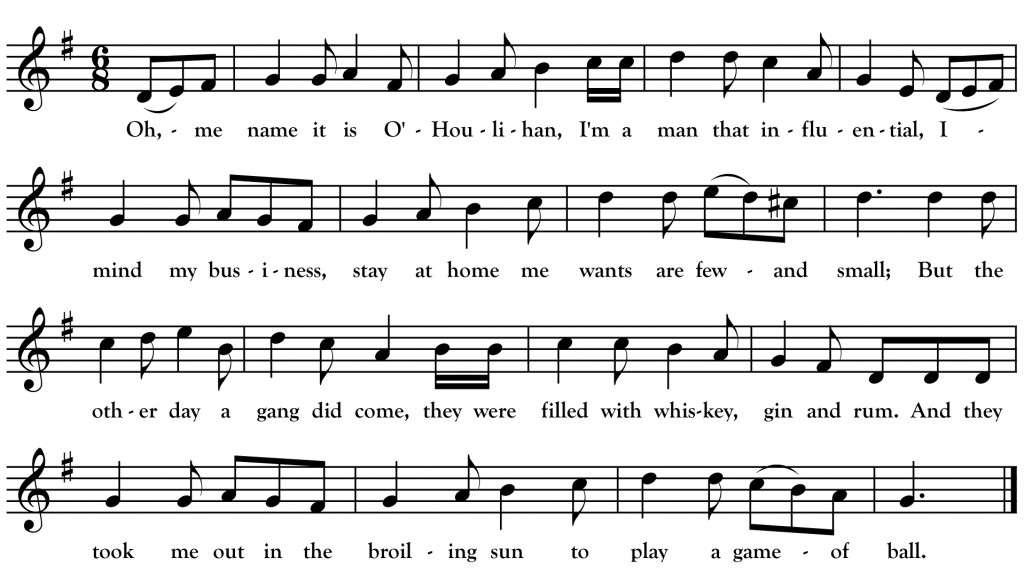The Day That I Played Baseball
Oh, me name it is O’Houlihan, I’m a man that influential,
I mind my business stay at home me wants are few and small;
But the other day a gang did come, they were filled with whiskey, gin and rum.
And they took me out in the broiling sun to play a game of ball.
They made me carry all the bats, I thought they’d set me crazy,
They put me out in the center field, sure I paralyzed them all;
When I put up me hands to stop a fly, holy murther, it struck me in the eye,
And they laid me out by the fence to die on the day that I played baseball.
There was O’Shaughnessy of the second nine, he was throwing them underhanded,
He put a twirl upon them and I couldn’t strike them at all;
The umpire he called strikes on me; “What’s that?” says I, “You’re out,” says he,
Bad luck to you O’Shaughnessy, and the way that you twirled the ball.
Then I went to bat and I knocked the ball I thought to San Francisco,
Around the bases three times three, by Heavens, I run them all,
When the gang set up a terrible howl, saying, “O’Houlihan, you struck a foul,
And they rubbed me down with a Turkish towel on the day that I played baseball.
The catcher swore by the Jack of Trumps that he saw me stealing bases,
And fired me into a keg of beer, I loud for help did call;
I got roaring, staving, stone-blind drunk, I fell in the gutter, I lost my spunk,
I had a head on me like an elephant’s trunk on the day that I played baseball.
The reporters begged to know my name and presented me with a medal,
They asked me for my photograph to hang upon the wall;
Saying, “O’Houlihan you won the game,” though me head was sore and shoulder lame,
And they sent me home on a cattle train all the day that I played baseball.
____________________________________________________________
A seasonal selection from the repertoire of Mike Dean: Irish American lumberjack/saloon-keeper who lived in Minnesota from 1885-1931. Dean’s self-published songster The Flying Cloud contains many songs from the Irish-American music hall stage and this one falls squarely in that genre.
This song was written by Patrick James Rooney (1844-1892) in 1878. Rooney was a “clog dancer” who, along with his son, Pat Rooney Jr., had one of the most famous vaudeville song-and-dance men of his day. William H. A. Williams, in his book ’Twas Only an Irishman’s Dream writes: “In spite of moments of burlesque when he would sing ‘Biddy the Ballet Girl’ and then clog around on his toes dressed in a tutu, Rooney was apparently a graceful dancer.” Irish performers like the Rooneys dominated American popular music in the late 1800s. “The Day I Played Baseball” was one of Pat Sr.’s few successful compositions. It was eventually overshadowed in 1908 by another baseball song in which “Katie Casey” begs her man: “Take Me Out to the Ball Game.”
In my search for information on Mike Dean’s life in Hinckley, Minnesota (1885-1908) I have found that baseball was wildly popular in Hinckley in the 1890s. Local papers in 1889 proclaimed a “baseball craze” in Hinckley and summer papers thereafter were filled with accounts of the exploits of the Hinckley Monarchs.
Interestingly, the sheet music I found for Rooney’s version of his own song (from which I took the above melody) only had four verses where Dean’s has six. Perhaps Dean composed the verses (missing in the sheet music) about the ball-twirling O’Shaughnessy and the catcher’s intoxicating “punishment.” Maybe the added verses were even based on experience?
_____________________________________________________________
More on this song online:
Original sheet music for “The Day I Played Baseball” courtesy of the Library of Congress


